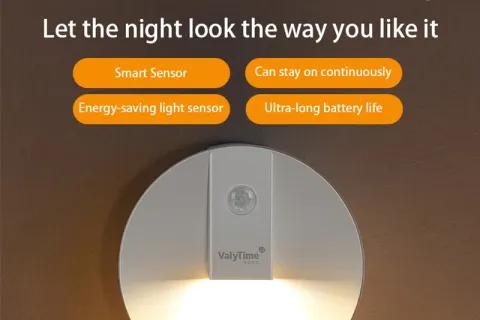Sometimes, motion-activated LED lights do not automatically turn off after the scheduled time, wasting energy. Possible causes include: • Improper sensor settings • Sensor failure to detect the light correctly
LEDs (Light Emitting Diodes) are solid-state light sources that generate light using semiconductor materials. Compared to traditional incandescent and fluorescent lamps, LEDs offer several distinct advantages, making them particularly suitable for use in dressing table lighting.
Motion-activated LED lights rely on accurate sensor detection to operate. If the sensor misoperates, the light may turn off without apparent cause. Common causes of malfunction include: • Improper sensor placement • Environmental interference • Small sensing area
If you're looking for simple, even lighting, round LED lamps are undoubtedly the better choice. If you prefer a modern, unique decorative effect, square LED lamps are more suitable. Ultimately, consumers can choose the most suitable LED lamp based on their space needs, design style, and desired lighting effects.
LED lighting fixtures usually have built-in heat dissipation devices to reduce heat, but if the working environment temperature is too high, the heat dissipation effect may be insufficient, which will shorten the service life of the LED lights and even cause premature failure.
Most motion-activated LED lights offer a time delay setting. Users can customize the delay parameters according to actual needs, such as setting the light to stay on for 30 seconds, 60 seconds or longer after detecting motion. This setting is mainly achieved through the built-in control circuit.
The most notable feature of track lights is the adjustable direction and angle of the fixtures. This allows them to precisely illuminate specific areas or objects, making them particularly suitable for accent lighting or display lighting. Recessed LED lighting, on the other hand, is fixed in place and cannot be adjusted in direction.
The most common way to conceal LED light strips is to use specially designed troughs or trough frames. These light troughs are typically made of plastic, aluminum alloy, or stainless steel, providing excellent heat dissipation, preventing the LED light strip from overheating.
Lumen (lm) is a unit used to quantify the brightness of a light source. It represents the total amount of light emitted by a light source per unit time. Simply put, lumens are a standard for measuring the "luminosity" of a light source. For example, when we say a light bulb has 800 lumens, it means that when operating, it emits a total of 800 lumens of light per second.
A significant advantage of LED lighting is its compact size, wide variety, and adaptability. Whether recessed, strip lights, spotlights, or sensor-based lighting, LED lighting can be customized to suit the specific closet space.
One of the most direct differences is the type of light source. LED downlights use LEDs exclusively as the light source, while recessed lights can use a variety of different light sources. Traditional recessed lights often use halogen lamps, incandescent lamps or fluorescent lamps, but with the development of LED technology, more and more recessed lights are beginning to use LED light sources.
• General bedroom: 30-40 lumens/m2 • Large bedroom or master bedroom: 40-50 lumens/m2 • Bedside area: The brightness of the bedside lamp should be moderate, generally around 100 lumens (can be adjusted appropriately according to specific needs).












